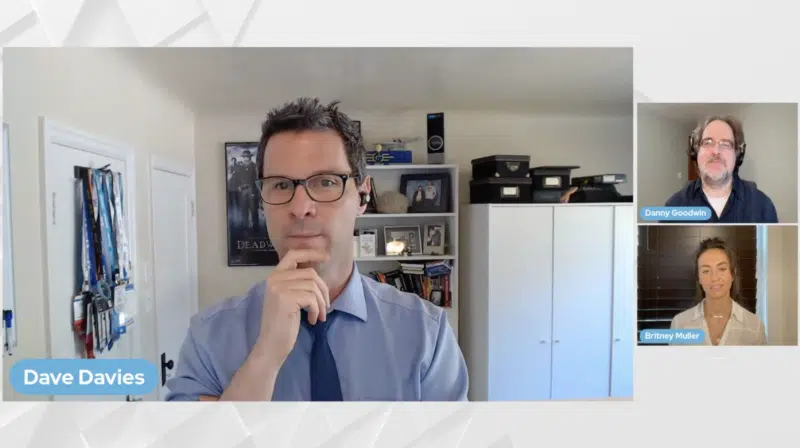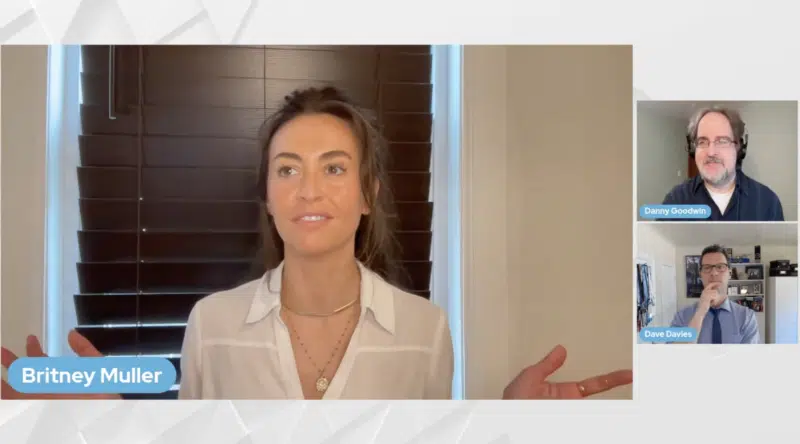How generative AI will change SEO as a profession
AI isn't coming for our jobs just yet, but the industry is changing. Here's what generative AI means for the future of SEO.
Generative AI is going to revolutionize the SEO industry, but perhaps not in the way you think.
Yes, your day-to-day job as an SEO will most likely look different in a few years. But are bots going to replace you?
“Absolutely not,” said Britney Muller, Marketing & SEO Consultant at Data Science 101, and Dave Davies, Amplification Team Lead at Weights and Biases. But there’s no denying the industry is evolving.
So how will generative AI change SEO as a profession and what can you do to stay ahead of the curve? Muller and Davies shared their thoughts on generative AI and the future of SEO at SMX Advanced.
AI is not replacing SEO
Muller was adamant that AI would not be coming for SEO jobs. However, she did note that the industry would have to adapt depending on how Google incorporates AI into search results:
- “AI is not the be-all and end-all. In fact, I think the shine will start to wear off as we continue to see the limitations of large language models (LLMs) and how much additional work is required to do things well.”
- “LLMs have so many issues that the researchers building this technology have yet to figure out. They are based on a probability distribution and are consistently not factual.”
- “Google has done information retrieval very well within search and I think LLMs could be a nice addition to really better define the questions that people have and surface additional information.”
Technical SEOs will have an advantage
Davies added that technical SEOs may be better positioned to handle the change that generative AI brings than those specializing in content SEO:
- “John Mueller from Google said that as long as machines read websites, technical SEO will remain as important as it is. I think that summarizes exactly what sort of world we’re heading into now.”
- “I think technical SEOs are going to have a bit of an advantage – but content SEO will eventually follow. It just just has to change. The structure that they’ll be optimizing for I think will change.”

Links may evolve
Both Davies and Muller agreed that links may change form and not be such a significant ranking factor in the future. Things like mentions or references to a site may become more valuable signals than traditional links. As Davies explained:
- “I’m not saying link building is dead, but I think its value is about to be significantly adjusted. It will evolve and might not look like the traditional links that we know and use today – but some version of that instead.”
- “Think about the way LLMs are constructed in this linguistic space. They use tokens and they use relationships to make connections. Those things are still very important.”
- “The whole mission of neural networks is to establish understanding between different things and so I believe that will still carry weight – but it might not look as specific as links and link building. Perhaps it could be mentions instead? Perhaps it could take the form of something else and just evolve.”
Prompt customization is key
SEOs will need to master prompt customization for AI to deliver the best results, according to Muller. Fine-tuning based on goals and data is crucial vs. a one-size-fits-all approach.
- “You really need to customize prompts, learn about prompt engineering and implement those things strategically. I know Andrew Ng just came out with a really great quick and easy course, partnered with Open AI, on that very topic and does a beautiful job explaining those key concepts. So I would definitely check that out,” Muller said.
- “ChatGPT actually has an API that you can use to customize prompts. It makes things a bit easier for the people that I work with, for my teams, for my clients, and it kind of puts the power in their hands as far as here’s how we need to approach this with an iterative process.”
Saving time on content creation
Numerous SEOs are exploring generative AI for content creation, including headlines, product descriptions and articles. There are current concerns with the quality of responses, however, these issues could potentially be resolved over time, as Davies pointed out:
- “Generative AI can write quite well. Is it right all the time? No. It’s just a little hack right now. But moving forward, this will speed things up – like with tasks that I was previously doing manually such as looking at what entities were on a page.”
- “I still need to use my brain and go OK, [generative AI] missed this and that. I then also need to fact-check. But this saves me probably half an hour per piece of research.”

Search may expand beyond webpages
In the future, search may move beyond webpages into new environments that don’t yet exist on the web today.
- “In the next five years, I think we’re just going to see a move into two different sorts of landscapes. I think search will diminish a little bit and move into, I don’t want to say Metaverse, but into different environments that don’t exist right now,” Davies said.
Simplifying code
Muller already uses ChatGPT extensively as a code assistant, highlighting that it’s particularly adept at tasks like generating Python scripts:
- “I think it’s important to make note that code in its nature is supposed to be unambiguous, unlike human language, and so generative AI is a lot better, in my opinion, at generating accurate code outputs for things I’m trying to accomplish, whether it be a Python script for a program or just pandas to clean up data. It’s phenomenal at those tasks.”
Judicious use is required
Although generative AI will transform SEO as a profession, careful application is still essential due to the potential for incorrect uses – and this is the reason Muller doesn’t believe that this technology represents the end of SEO as a career. At least not yet.
- “Remember, generative AI is a prediction model based on a probability distribution. So if you imagine that it only read let’s say 100 books that were in the realm of sci-fi, and you ask it a medical question, it’s not going to do so well. But it might do really well with generating a new sci-fi character,” Muller said.
- “Given that context, generative AI is only as good as the text and information it’s trained on, which is inherently problematic because ChatGPT and LLMs are essentially trained on all of the Internet, which isn’t the best place to grab completely factual information or have representation across marginalized groups of people and topics.”
- “These models don’t have emotions. They aren’t reasoning. They don’t have common logic like humans do. And so you have to be really, really, really careful about how you use them, because it’s very easy when you enter a prompt to automate the bias that you already have by the sheer nature of how you ask a question, it’s going to follow that train of thought.”
Watch: Generative AI and the future of SEO
Below is the complete video of the SMX Advanced panel with Davies, Muller and Search Engine Land Managing Editor Danny Goodwin.
Opinions expressed in this article are those of the guest author and not necessarily Search Engine Land. Staff authors are listed here.
Related stories
New on Search Engine Land